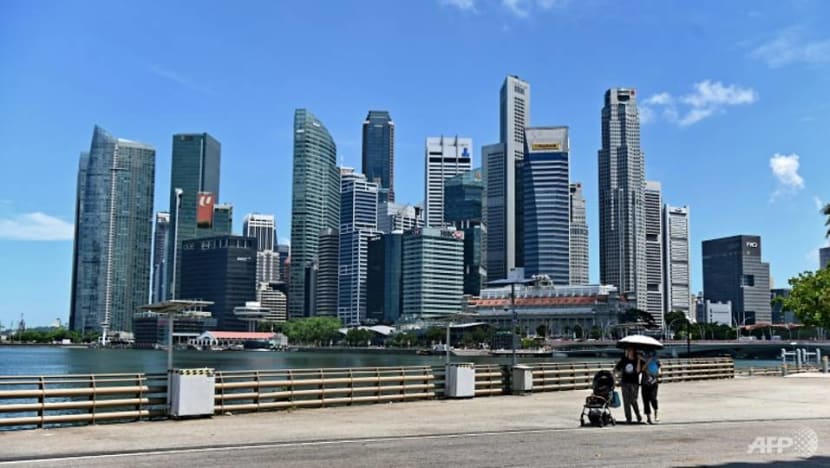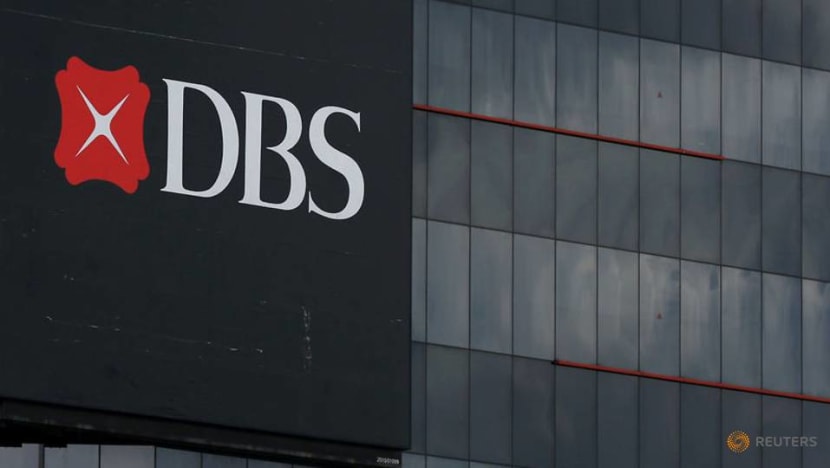commentary Commentary
Commentary: Singapore's new growth strategy for tomorrow involves luring 500 global tech leaders today
The Tech.Pass scheme is a needed booster in attracting tech talent in a fiercely competitive digital world, says NUS Business School’s Lawrence Loh.

The Singapore city skyline. (Photo: AFP/Roslan RAHMAN)
SINGAPORE: Even in the midst of a political climate where the narrative of foreign talent displacing locals has been a longstanding contentious issue revived by a challenging job market in a global pandemic, Singapore seems to be at it again.
The country’s Economic Development Board (EDB) just announced that a new scheme, dubbed the “Tech.Pass”, will be launched next January where talent with significant leadership experience in tech companies or product development will be welcome to locate in Singapore.
But this time around, the strategy in global talent attraction is a fundamental shift from the past, where foreign managerial manpower and specialists in a wide range of domains were brought in under the Employment Pass scheme.
The minimal qualifying salary for that programme is S$4,500 (and S$5,000 for financial services).
In comparison, the bar for Tech.Pass is many times higher. It seems targeted at C-suite tech leaders and developers creating applications and technologies of the future.
Candidates must fulfil two of the following criteria: Draw at least a S$20,000 fixed monthly salary, have five cumulative years in a leading role of a tech company with at least a valuation of US$500 million (S$674 million) or US$30 million in funding, or have five cumulative years of experience in developing a tech product with 100,000 monthly active users or at least US$100 million revenue.
Even then, the pass is not an entry that lasts in perpetuity. It is good for two years and will have to be extended after. Only 500 will be picked.
READ: IN FOCUS: After COVID-19, where are the Singapore economy, workforce headed?
READ: Commentary: Winds in the Singapore economy sails are starting to stir
There are two substantive aspects of the new talent scheme that merit further examination – tech and timing.
THE FOCUS ON HIGH GROWTH HIGH TECH
Unlike existing work pass schemes under the Ministry of Manpower or even the EDB’s Global Investor Programme which are “horizontal” in catchment and directed at investors who can help identify plum choices for the next investment, the Tech.Pass is a “vertical” approach that pinpointedly targets high potential companies in high tech domains that are seeing exponential growth.
Tech.Pass is a class of its own attracting a highly select and skilled clientele that is globally mobile and fiercely sought by many top capitals of the world.

The capabilities sought will involve expertise in cutting-edge technologies including the oft-touted “ABCD” – artificial intelligence, blockchain, cloud computing and data analytics – areas birthing unicorns and companies at the pre-unicorn stage.
The world is also now seeing, particularly arising from the COVID-19 pandemic, an unprecedented focus on applications of deep technologies in hot areas like medtech, edutech and the veritable fintech like never before.
And cutting across all applications will be the need for high-end cybersecurity, and the projected pervasive use of enabling technologies like 5G.
READ: Commentary: How Tencent became world’s most valuable social media company – and then everything changed
Start-ups in these areas with a demonstrable path to growth and profit that satisfy investors hold the key to unlocking the next stage of Singapore’s growth in an increasingly digital global economy but they don’t appear every day.
Investors are hungry for options. The money is here but where are the investments and founders?
Singapore’s Temasek Holdings is in active discussions for its first direct investments in healthcare and education start-ups in Southeast Asia.
This is a serious bet on the burgeoning digital economy, slated to triple to more than US$300 billion by 2025 in Southeast Asia, according to Google and Bain and Co.
The fintech sector too has huge potential, looking at the rapid growth it has enjoyed in China, notwithstanding the recent curbs on Alibaba’s Ant initial public offerings in Hong Kong and Shanghai.
READ: Commentary: Ant Group will be back, but its path may not be as smooth-sailing
READ: Commentary: Looks like China has its own '+1' strategy and Southeast Asia is it
Fintech investors from across the world will be redoing their sums again to optimise their investment portfolios across possible locations.
Southeast Asia, including Singapore, may potentially be part of the new equation, particularly when one considers DBS’s reported plans to establish a digital exchange which will allow cryptocurrencies and other digital securities to be traded against the Singapore dollar and a few other currencies.
This move by digitally savvy DBS, awarded the world’s best bank by eminent publications Euromoney and Global Finance, will spawn even more demand for fintech talent across the economy.

Interestingly, a recent report by The Business Times pointed to a severe talent gap in cybersecurity in Singapore. This will dangerously leave many firms exposed to cyber and data privacy threats.
Even more significant is that the Asia-Pacific region has an estimated whopping 2.6 million cybersecurity workforce gap, accordingly to the International Information System Security Certification Consortium.
The upshot is that there will be many areas of needs for high tech in Singapore.
READ: Commentary: The future is tech but where is Singapore’s engineering and IT talent?
Transformational leaders of the fields will be required to answer the market’s siren call, but the country will face tough competition as cities around the world will fight tooth-and-nail to lure this crème de la crème of the talent pyramid.
THE FOCUS ON TIMING
COVID-19 has presented even more opportunities for high tech. Tech companies with the right offerings have found the sweet spot of good timing during the crisis to make momentous gains.
The obvious example is Zoom Video Communications which had people and companies zooming in and out of virtual meetings during the pandemic.
With its valuation now topping Boeing and 3M, it has become such an indispensable tool as the world made the overnight digital work-from-home leap, that for many businesses to continue to survive, it is “zoom or doom”.
The pandemic presents a short time window where there will be great demand for game-changing talent leaders. There are few of these talents around the world, but many locations who want them.
LISTEN: Recovery, restructuring and possibly rebound? The outlook for the Singapore economy
READ: Commentary: The biggest restructuring exercise facing Singapore businesses has just begun
Singapore is not alone in using incentives to draw tech talents onshore. Established economies like Australia, France and United Kingdom have similar talent schemes, some of which are more aggressive than Singapore’s.
Australia’s Distinguished Talent Visa offers permanent residency. France’s Tech Visa programme does not require local options be exhausted before a position is filed by a foreigner. And the United Kingdom’s Global Talent Visa, with its five-year term, can be extended to immediate family members.
Still, Singapore is well-placed to attract foreign talent. In the list of most competitive places for talent released just this month by the Institute for Management Development, Singapore is ranked top in Asia and within the top ten in the world.

Notably, it is ranked above Australia, France and United Kingdom.
While the pandemic is still ravaging parts of the world especially North America, Western Europe and South Asia, it is natural that globally mobile tech talent may want to look around to see where they can leverage their time more fruitfully.
READ: Commentary: Singapore could be a model for cooler cities in a world heating up
From a practical angle, tech talent may wish to pivot to localities that have done well in combating the coronavirus outbreak and keeping infection numbers under control.
To them time is also money. Innovation nodes, with fresh pots of money and ecosystems offering business opportunities that allow them to take their innovation to market faster, can look like good options. Tech innovators cannot wait – there is always a risk someone will beat them.
READ: Entrepreneurs try to find opportunity amid the COVID-19 uncertainty
READ: Commentary: More bold measures needed to protect against the job losses heading Singapore's way
Receiving countries also cannot afford to wait. They seek talent that can be purpose-fit right away on arrival and be ready to plug and play from day one.
Timing will be the final arbiter in this ferocious location competition. Countries have to double down urgently on attracting tech talent now.
For Singapore, the timing is perfect as its economy needs value boosters.
The planned 500-odd Tech.Pass holders will be queen bees to create jobs and multiply opportunities for economic growth.
Lawrence Loh is director of Centre for Governance, Institutions and Organisations at NUS Business School where he is also associate professor of strategy and policy















